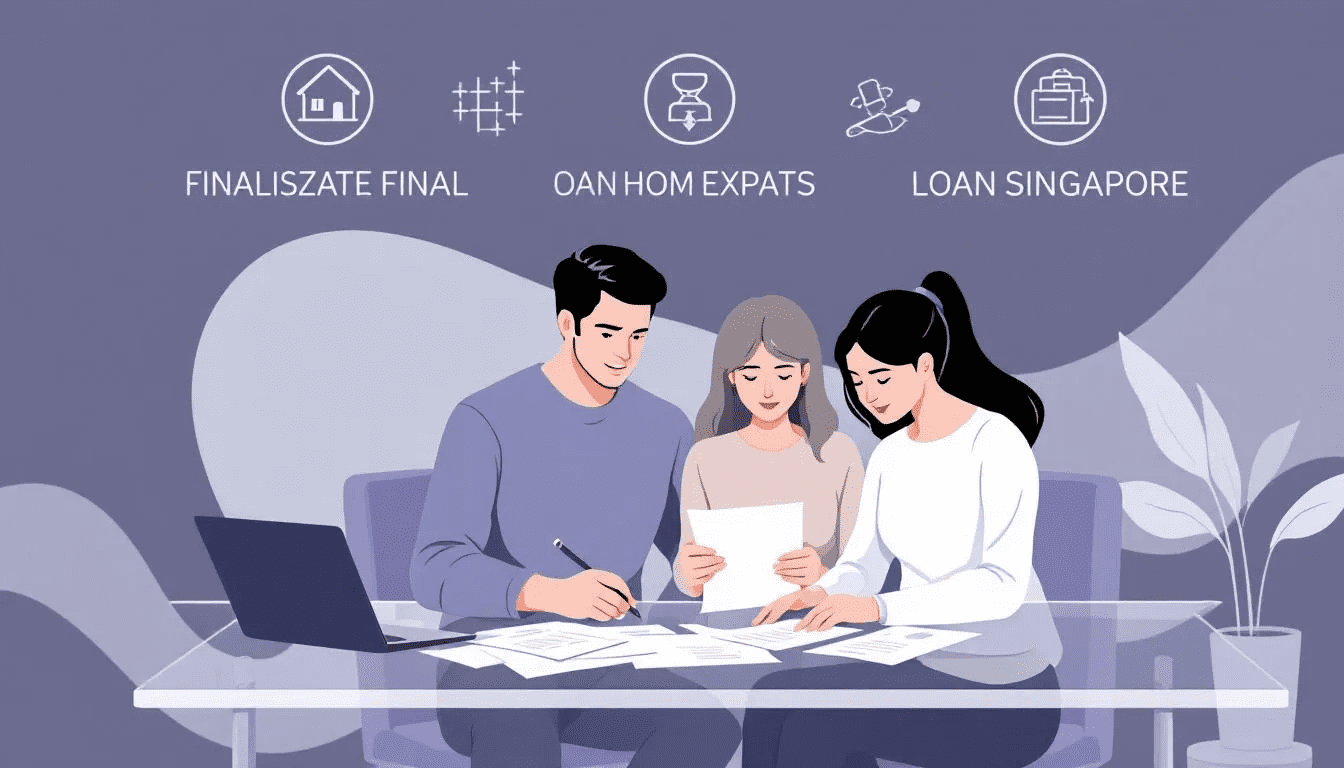Buying private property in Singapore? This guide covers everything you need to know—from types of properties and eligibility requirements to financial planning and stamp duties—related to buying private property in Singapore to make your property buying process smoother.
Key Points
- Know the different private property types in Singapore: condominiums, landed properties and executive condominiums, each catering to different needs and preferences.
- Assess your eligibility and budget carefully, including stamp duties, to make the property buying process in Singapore smoother.
- Negotiate purchase price and finalize the Option to Purchase (OTP) to secure your spot in the property market, ensuring all legal and financial commitments are met.
- First-time buyers should understand the unique considerations of purchasing their first property, including budgeting, loan eligibility, and the overall buying process.
- Consider asset progression as part of your long-term property investment strategy, planning how to move through different property stages to build wealth and maximize returns.
Understanding the Types of Private Properties in Singapore

The Singapore property market offers a wide range of private residential properties to suit different needs and preferences, including resale private property and property in Singapore. Private residential property includes both new and resale condos, as well as landed homes, which differ from HDB flats in terms of ownership restrictions, eligibility criteria, and flexibility in resale. There are three main types: condominiums, landed properties and executive condominiums (ECs).
Condominiums are the most popular choice among young professionals and expats. They often come with shared facilities such as swimming pools, gyms and barbecue pits, offering convenience and luxury. The sense of community and the array of amenities make condominiums a great option for those who want a balance between work and play. Resale condos, in particular, offer flexibility in price negotiation and immediate occupancy compared to new launch condos.
For those who want privacy and space, landed property is the ultimate dream home. These include bungalows, semi-detached houses and terrace houses. Landed properties have more outdoor space and greater privacy compared to other property types.
They are ideal for families who love gardening, outdoor activities or just the luxury of a bigger living area. If you’re looking to invest, you may want to consider options to buy landed houses. For new landed properties, the housing developer plays a key role in ensuring the quality and maintenance of the development, often providing warranty periods for first-hand buyers.
Executive condominiums (ECs) are a unique proposition as they are a hybrid of public and private housing. Available to qualified buyers, ECs have lower entry prices compared to private condominiums, making them a great option for first-time buyers or those upgrading from HDB flats.
Compared to HDB flats, which have strict eligibility criteria, pet ownership restrictions, and rental policies during the Minimum Occupancy Period, ECs offer a pathway to private property ownership with the benefit of subsidized prices and similar amenities, including new launch condos.
Check Your Eligibility to Buy Private Property
Before you enter the property market, you need to check your eligibility. A Singaporean has the least restrictions and can buy private property without any restrictions. This flexibility makes it easier for Singaporeans to move from HDB flats to private residential properties.
Permanent Residents (PRs) have certain restrictions. They need to have held their PR status for at least 5 years to buy HDB flats, and must meet eligibility criteria set by the Housing Development Board. Additionally, a Singapore permanent resident must fulfill these requirements before being eligible to purchase private property. PRs often need to seek advice from a property agent to navigate these rules effectively. A PR must also be aware of these restrictions.
Buyers must secure an Option-to-Purchase (OTP) agreement before buying property in Singapore, which gives you exclusive rights to purchase the property.
Foreigners Guideline
Foreigners have the most restrictions when buying residential properties. They are generally not allowed to buy landed properties outside of Sentosa Cove unless they can show significant economic contributions and get approval from the Land Dealings Approval Unit (LDAU).
Foreigners who wish to purchase private property in Singapore face additional restrictions, including higher stamp duties and limitations on certain property types. Foreigners above 21 cannot buy landed property or HDBs in Singapore unless they marry a Singapore citizen.
Understanding these eligibility criteria is important to make your property search smoother and avoid any legal issues. Knowing your status helps you to identify the right property and avoid any complications.
Budgeting and Financial Planning
Financial planning is the foundation of any property purchase. The property market in Singapore is divided into three regions. These regions are Core Central Region (CCR), Rest of Central Region (RCR) and Outside Central Region (OCR). Each region has different property prices, with CCR being the most expensive and OCR the most affordable.
When budgeting for a property, consider:
- The down payment is 25% of the purchase price.
- For first-time buyers, 5% must be paid in cash.
- The remaining 20% can be financed through the CPF Ordinary Account.
CPF Ordinary Account (OA) savings can be used for the property purchase, subject to CPF withdrawal limits and the property’s valuation limit (VL).
This financial strategy allows you to use your CPF savings effectively.
Beyond the purchase price, additional costs such as legal fees, maintenance fees and renovation expenses must be factored in. These costs can add up quickly so it’s important to have a clear understanding of your monthly income and expenses to manage cash flow. Evaluating long-term financial obligations ensures you can sustain the property investment without compromising your lifestyle, especially when considering the big financial commitment involved. Planning for regular loan repayments is crucial to avoid financial strain.
When assessing your financial obligations, note that credit card debt and other liabilities are included in the Total Debt Servicing Ratio (TDSR) calculation, which affects your loan eligibility.
Explore various financing options, including a bank loan and government assistance, to have more flexibility and better terms. Financial planning is not just about affording the property but also maintaining it comfortably over the years.
When selecting a property for investment, consider its capital appreciation potential, as factors like location, supply, and market trends can significantly impact future value.
Navigating Property Stamp Duties

Stamp duties are a mandatory part of the property buying process in Singapore. The buyer’s stamp duty is a tax that all property buyers must pay, calculated based on the purchase price or the valuation price of the property, whichever is higher. There are two types of stamp duties: buyer’s stamp duty and additional buyer’s stamp duty (ABSD).
Additional buyer’s stamp duty is a separate cost from buyer’s stamp duty, with rates that vary depending on the buyer category. For example, Singapore Permanent Residents pay a lower ABSD compared to foreigners, who may pay up to 20%. These additional costs can be significant, so it’s important to factor both buyer’s stamp duty and additional buyer’s stamp duty into your financial planning.
Exemptions from stamp duties can be available under certain conditions, such as buying a property under a trust. However, any transfer of residential property into a living trust will incur an ABSD of 35%, calculated based on the valuation price or purchase price, whichever is higher. Understanding how the valuation price is used as a reference for both buyer’s stamp duty and additional buyer’s stamp duty helps you plan your property purchase better.
Navigating stamp duties can be complex but being informed avoids unexpected costs and legal issues. Consult with a property agent or legal advisor to get clarity and make informed decisions.
Finding and Comparing Home Loans
Getting the right home loan is key to a successful property purchase. In Singapore, home loans are mainly fixed-rate loans which offer stability by locking in an interest rate for a set period and floating-rate loans linked to market rates like SORA which can fluctuate. Many buyers also consider an HDB loan as an option to finance their property purchase. A housing loan is a long-term financial commitment, so buyers should compare different loan types and features, such as interest rates, loan-to-value ratios, and eligibility criteria, before making a decision.
Getting an Approval in Principle (AIP) gives you an estimate of the loan amount you can borrow from a bank. This is important as it gives you a clear budget when searching for properties. Also, the Total Debt Servicing Ratio (TDSR) cap of 55% of your gross monthly income is crucial for loan approval.
When comparing home loans, consider the average effective rate over 2-3 years rather than just the initial low rates. Compare interest rates from different banks to get the best deal and make your property purchase more affordable in the long run, especially when factoring in your monthly mortgage.
Shortlisting Suitable Properties

Shortlisting the right property is a crucial step in the property buying process. When evaluating properties, consider the condition of the property, maintenance fees and available amenities. Inspect for defects like cracks and stains on walls, ceilings and floors to ensure there are no hidden issues. For resale properties, a more thorough inspection and due diligence are necessary, as their condition and legal considerations may differ from new launches.
The layout of the property can impact its future resale value. A good layout not only makes living more comfortable but also makes the property more attractive to buyers. High maintenance fees relative to the facilities offered should be carefully evaluated as they can complicate future resale. Additionally, always check the remaining lease of the property, as it affects CPF withdrawal limits and loan eligibility.
External factors like proximity to public transport and nearby amenities can affect the property’s desirability especially when comparing to similar properties. Stay up to date with government master plans and new developments in the area, as these can significantly impact property value. View the property during peak hours and when the property gets plenty of natural light to get a better assessment of the property.
Negotiating the Price
Negotiating the price is an art that can save you a lot of money. If you’re not sure of your negotiation skills, seek help. A experienced property agent can be very useful in such situations. They can give you insights of the property market and help you with price negotiation to get better terms.
If the price markup seems too high, consider the following:
- Don’t be afraid to negotiate downwards.
- Know the market value of the property to make an informed offer.
- Don’t show desperation during negotiations as this can weaken your bargaining power.
Stay calm and get the best deal.
Getting the Option to Purchase (OTP)
The Option to Purchase (OTP) is a crucial document in the property buying process. It’s a legal contract that gives the buyer exclusive rights to purchase the property within a specified period. Once an OTP is issued, the seller cannot sell the property to anyone else.
To get an OTP for a condo in Singapore, you need to:
- Pay a booking fee of 1% of the purchase price which must be paid in cash.
- After getting the OTP, pay an additional deposit of 4% of the property price.
- Engage a conveyancing lawyer before negotiating with the seller to understand the terms and legal implications.
The usual timeframe to exercise the OTP is 2 weeks but this can be negotiated. If you back out after getting the OTP, you will lose the option fee. The option fee will be given to the seller.
Finalizing Your Home Loan

Finalizing your home loan involves several steps. You need to submit the following documents: OTP agreement, income tax records, salary slips and valuation report. If you don’t have a valuation report, the bank can help you get one.Once the loan is approved, set up loan servicing accounts and CPF deductions. Engage a conveyancing lawyer to manage legal documents and ensure compliance during the property purchase.
On completion date, ensure all payments including option fee are made through secure and traceable methods. Lawyers will request a cashier’s order a few days before completion to ensure funds are ready.
Exercising Your Option to Purchase (OTP)
Exercising the OTP is a big step in the property buying process. To do this:
- Pay 4% of the property price as down payment.
- Make this payment on the same day or shortly after exercising the OTP.
- Exercise the OTP within the Option Period which is 21 calendar days.
Flat buyers must sign the OTP and return to the seller to complete the exercise process. If OTP is not exercised within the specified period, the Option Fee will be forfeited.
Final Inspection
Final inspection is a crucial step to ensure the property is in the agreed condition and unoccupied before you complete the purchase. This inspection allows you to verify that there are no new defects or issues that have arisen since you last viewed the property. This is your last chance to ensure everything is in order before the transaction is completed.
Once you have exercised the Option to Purchase (OTP), you must lodge a caveat with the Singapore Land Authority to protect your interest in the property. This legal step ensures your claim to the property is recognized and prevents the seller from selling it to someone else.
During this period, you also need to pay the Buyer’s Stamp Duty (BSD) and Additional Buyer’s Stamp Duty (ABSD) if applicable within 14 days of signing the OTP. This is part of the whole process to avoid any legal issues.
Completion Of Purchase

Completion of purchase is the final step. Ensure you have sufficient funds to pay the full purchase price and associated costs before the completion date. Additional costs like stamp duties and legal fees should be settled before the entire property transaction process. Once this is done, it marks the end of the entire process of purchasing private property in Singapore.
On completion day, you will visit your lawyer’s office to settle all outstanding fees and payments. Your lawyer will handle the transfer of the final payment to the seller. Have enough funds to cover the remaining purchase price. The lawyer will also record the transaction in the land registry and confirm your ownership of the property. After payment is settled, the lawyer will facilitate the handover of the property keys to you. This is the final step of the property purchase and you can now take possession of your new home.
Conclusion
Buying private property in Singapore is a complex process that requires careful planning and informed decision making. From understanding the types of properties, assessing your eligibility and budget, to navigating stamp duties, finalizing home loans and completing the purchase, every step matters. Follow this guide and you will be more confident in approaching the property market and getting the home of your dreams. Remember research and professional advice are your best friends in this journey.
If you are interested in purchasing private property in Singapore, consider exploring our latest project, The Robertson Opus. This exclusive development offers luxurious living with prime location and exceptional amenities, making it an ideal choice for discerning buyers seeking a dream home or a sound property investment.
FAQs
Can foreigners buy private property in Singapore?
Foreigners can buy private property in Singapore but may need to get approval from the Land Dealings Approval Unit (LDAU) or be married to a Singapore citizen.
What types of private properties are available in Singapore?
In Singapore, the main types of private properties are condominiums, landed properties and executive condominiums (ECs). Each option suits different preferences and lifestyles.
What is an Option to Purchase (OTP)?
An Option to Purchase (OTP) is a legal contract that gives the buyer exclusive rights to purchase a property within a specified period, usually 2 weeks. This allows buyers to secure a property while they make up their mind.
How much is the down payment for a property in Singapore?
The down payment for a property in Singapore is generally 25% of the purchase price, with at least 5% to be paid in cash.
What are the additional costs involved in buying private property?
When buying private property, expect additional costs such as stamp duties, legal fees, maintenance fees and potential renovation costs. Fire insurance is also often required by lenders and is an important cost to consider for protecting your property investment. These can add up and impact your overall budget so factor them in.
